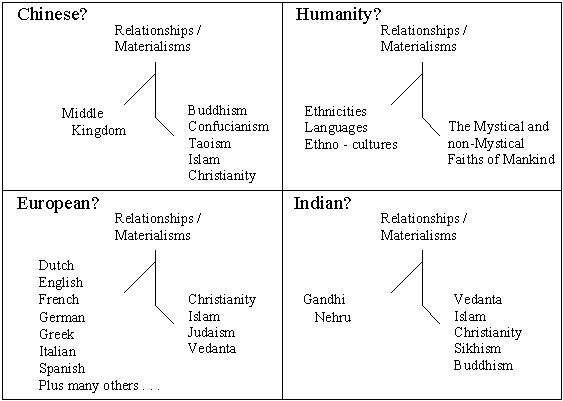Karl Marx quotation
On religion as the opium of the people
One of the more frequently quoted statements of Karl Marx is Religion is the opium of the people this being a
translation of the German statement "Die Religion ... ist das Opium des Volkes".
This statement appears in Karl Marx' - "A Contribution to the Critique of Hegel's Philosophy of Right" which appeared in the Deutsch-Französische Jahrbücher, as published in Paris on the 7 & 10 February 1844.
Many people, however, take Karl Marx' Religion is the opium of the people statement to be a plain and simple condemnation of religion but what Marx actually meant by saying about Religion and about it being the Opium of the People is somewhat more subtle than this:-
... Religion is the general theory of this world, its encyclopaedic compendium, its logic in popular form, its spiritual point d'honneur, its enthusiasm, its moral sanction, its solemn complement, and its universal basis of consolation and justification. It is the fantastic realization of the human essence since the human essence has not acquired any true reality. The struggle against religion is, therefore, indirectly the struggle against that world whose spiritual aroma is religion.
Religious suffering is, at one and the same time, the expression of real suffering and a protest against real suffering. Religion is the sigh of the oppressed creature, the heart of a heartless world, and the soul of soulless conditions. It is the opium of the people.
The abolition of religion as the illusory happiness of the people is the demand for their real happiness. To call on them to give up their illusions about their condition is to call on them to give up a condition that requires illusions. The criticism of religion is, therefore, in embryo, the criticism of that vale of tears of which religion is the halo.
Criticism has plucked the imaginary flowers on the chain not in order that man shall continue to bear that chain without fantasy or consolation, but so that he shall throw off the chain and pluck the living flower. The criticism of religion disillusions man, so that he will think, act, and fashion his reality like a man who has discarded his illusions and regained his senses, so that he will move around himself as his own true Sun. . .People are inclined to be somewhat spiritual !!!
This could mean that Religion is more than
the Opium of the People as Karl Marx would have it !!!A brief resume of some Pearls of Wisdom that may even qualify as being " Central Spiritual Insights " is set out in the following scrollable panel:-

Popular European History pages
at Age-of-the-Sage
The preparation of these pages was influenced to some degree by a particular "Philosophy
of History" as suggested by this quote from the famous Essay "History" by Ralph Waldo Emerson:-
There is one mind common to all individual men...
Of the works of this mind history is the record. Its genius is illustrated by the entire series of days. Man is explicable by nothing less than all his history. Without hurry, without rest, the human spirit goes forth from the beginning to embody every faculty, every thought, every emotion, which belongs to it in appropriate events. But the thought is always prior to the fact; all the facts of history preexist in the mind as laws. Each law in turn is made by circumstances predominant, and the limits of nature give power to but one at a time. A man is the whole encyclopaedia of facts. The creation of a thousand forests is in one acorn, and Egypt, Greece, Rome, Gaul, Britain, America, lie folded already in the first man. Epoch after epoch, camp, kingdom, empire, republic, democracy, are merely the application of his manifold spirit to the manifold world.
- 1 The European Revolution of 1848 begins
- A broad outline of the background to the onset of the turmoils and a consideration of some of the early events.
- 2 The French Revolution of 1848
- A particular focus on France - as the influential Austrian minister Prince Metternich, who sought to encourage the re-establishment of "Order" in the wake of the French Revolutionary and Napoleonic turmoils of 1789-1815, said:-"When France sneezes Europe catches a cold".
- 3 The Revolution of 1848 in the German Lands and central Europe
- "Germany" had a movement for a single parliament in 1848 and many central European would-be "nations" attempted
to assert a distinct existence separate from the dynastic sovereignties they had been living under.
- 4 The "Italian" Revolution of 1848
- A "liberal" Papacy after 1846 helps allow the embers of an "Italian" national aspiration to rekindle across the Italian Peninsula.
- 5 The Monarchs recover power 1848-1849
- Some instances of social and political extremism allow previously pro-reform conservative elements to support the return of traditional authority. Louis Napoleon, (who later became the Emperor Napoleon III), attains to power in France offering social stability at home but ultimately follows policies productive of dramatic change in the wider European structure of states and their sovereignty.
Slide Shows
Our Slide Shows summarise D-E-E-P Wisdoms about Human Existence
gleaned from World Faith teachings and other sources.
| |||
![]()
| |||
Our web site is quite extensive so we have prepared this introductory page
featuring these slide shows and offering this link that will
direct you towards finding interesting, (but more detailed and philosophical),
material about the "Tripartite" nature of Human Existence, about the Unfolding of History and about Comparative Religion.
![[Marx, opium of the people]](../enlightenment.gif)